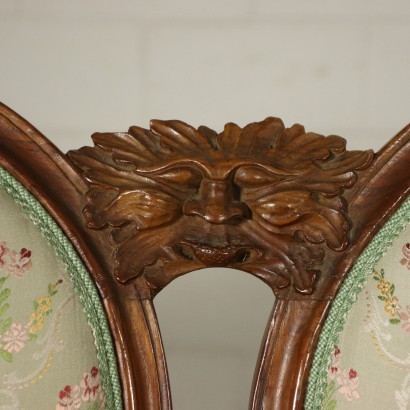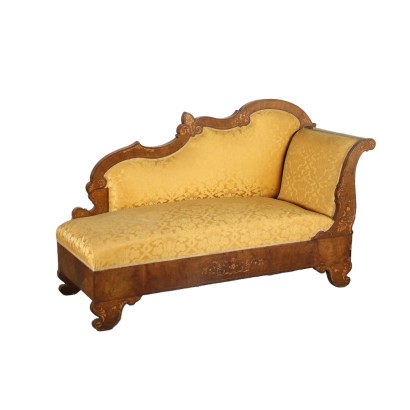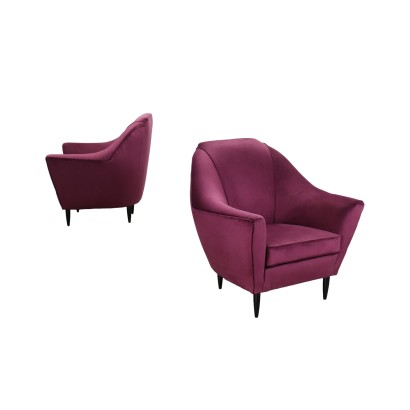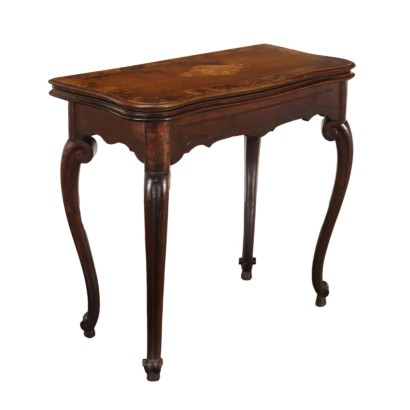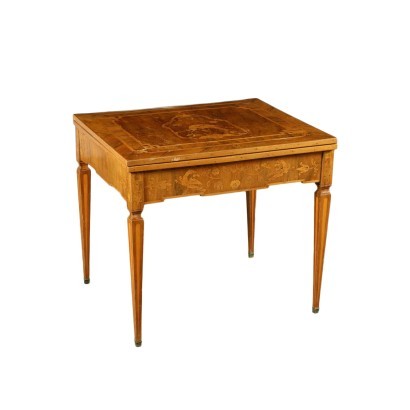Sofa Neoclassical Walnut Padded Emilia Romagna Italy 2nd Half 1700
Features
Style: Neo-Classical (1765-1790)
Age: 18th Century / 1701 - 1800
Origin: Emilia Romagna, Italy
Main essence: Walnut
Material: Padded
Description
Emilian neoclassical sofa supported by curved legs ending in curled feet, the lower band is shaped and decorated with rocaille and love knot carvings. The backrest is made up of four padded medallions with a cymathium carved in rocaille and connected with grotesque masks carvings. The distinctive masks with marked physiognomies are also carved on the armrests. In walnut, the seat is padded.
Product Condition:
Fair condition. Wear consistent with age and use. Any damage or loss is displayed as completely as possible in the pictures. Product with a Certificate of Authenticity and Lawful Origin.
Dimensions (cm):
Height: 93
Width: 167
Depth: 53
Seat height: 46
Certificate issued by: Enrico Sala
Additional Information
Style: Neo-Classical (1765-1790)
This historical period includes a first phase that can be properly defined as the Louis XVI style.nOnly at a later time, with the maturation of archaeological fashions, was a new vision of furnishing civilization formulated and codified, now fully attributable to the Neoclassical Style.
In fact, both trends coexisted in unison until the last years of the eighteenth century.
nIn the field of cabinet making, the Directoire, Retour d'Egypte, Consular and Empire styles also fall within the neoclassical era.
nFind out more about Neoclassicism with the insights from our blog...
n
Age: 18th Century / 1701 - 1800
18th Century / 1701 - 1800Main essence: Walnut
Walnut wood comes from the plant whose botanical name is juglans regia , probably originally from the East but very common in Europe. Light or dark brown in color, it is a hard wood with a beautiful grain, widely used in antique furniture. It was the main essence in Italy throughout the Renaissance and later had a good diffusion in Europe, especially in England, until the advent of mahogany. It was used for solid wood furniture and sometimes carvings and inlays, its only big limitation is that it suffers a lot from woodworm. In France it was widely used more than anything else in the provinces. In the second half of the eighteenth century its use decreased significantly because mahogany and other exotic woods were preferred.Material: Padded
Other customers have searched:
Tutto quello che c'è da sapere sui divani lo trovi nel nostro blog e su FineArt:
Un divano dell''800 esempio di eclettismo
Un divano neoclassico emiliano in cui un dettaglio è importante: Il nodo d'amore
Storia della dormeuse
Divano modulare Camaleonda di Mario Bellini
Divano "IX Triennale" Marco Zanuso per Arflex
Divano due posti 'Soriana', Afra & Tobia Scarpa per Cassina
Divano "D70", Osvaldo Borsani per Tecno
Quattro Divanetti lombardo-veneto del XIX secolo
Sull'antiquariato in generale dai un'occhiata anche a
Classic Monday: da un pezzo dei nostri magazzini alla storia dell'antiquariato
L'antiquariato dalla A alla Z: il Dizionario dell'Antiquariato
Il dizionario dell'antiquariato - Lastronatura
Il dizionario dell'antiquariato - Mascherone
Il dizionario dell'antiquariato - Natura morta
Il dizionario dell'antiquariato - Opificio
Il dizionario dell'antiquariato - Pastiglia
Il dizionario dell'antiquariato - Savonarola
Il dizionario dell'antiquariato - Rosone
Classic Monday: da un pezzo dei nostri magazzini alla storia dell'antiquariato
L'antiquariato dalla A alla Z: il Dizionario dell'Antiquariato







